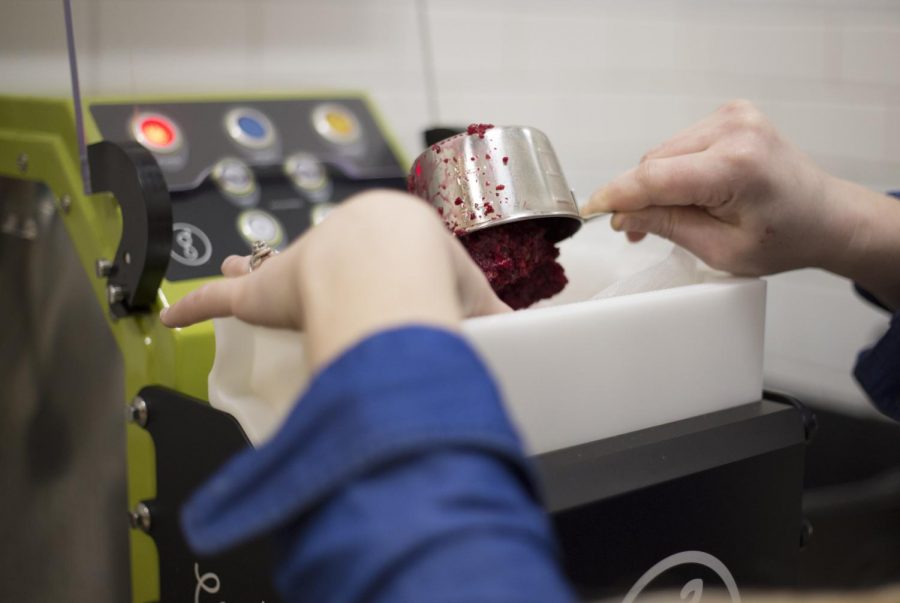Juice cleansing may rid food of nutrition
Juiced fruits, vegetables have uncertain health effects for those attempting to lose weight.
GEORGE RODRIGUEZ | The Daily Evergreen
An employee of Main Street Squeeze Juice and Smoothie makes juice. “There are many other ways to get [vitamins and minerals] from food without juicing them,” said Alice Ma, WSU Dietician.
January 10, 2018
The new year marks the beginning of many health trends, as people attempt to fulfill the common resolution of losing weight. Juice cleansing remains a popular method of achieving this, but it may not be the most effective.
Mintel’s 2014 study “Diet Trends” revealed 20 percent of adults attempting to maintain or lose weight did so by trying a cleanse.
The word cleanse refers to ridding the body of toxins left over from a poor diet through totally altering one’s diet for a certain number of days.
WSU dietitian Alice Ma said what many people do not realize is the vagueness of the term toxin. This makes it difficult for some when deciding the best way to lose weight.
“Generally, a toxin is something unhealthy the body can’t process,” Ma said. “The problem with the idea of cleansing the body of toxins is that we already have a liver to do those things for us.”
Most people should focus their efforts on maintaining a well-balanced diet and healthy liver, she said. This is the best way to detoxify the body.
Juice cleanses come in the form of cold-pressed juices. According to Raw Pressery’s website, juices from a variety of fruits and vegetables are bottled and placed into a cold, pressurized facility.
Cold-pressed juices are available for individual purchase, but juice cleanses come in bundles with labeled days for the consumer to drink them, according to Raw Pressery’s website. Cleanses are generally priced at above $50 for bundles.
Unfortunately, much of the nutritional value locked in these ingredients is lost when they are juiced and packaged, Ma said. Depending on the ingredient, the consumer loses necessary fiber and is left with water, vitamins and minerals.
“I don’t think consuming your fruits and vegetables this way is absolutely necessary,” Ma said. “There are many other ways to get [vitamins and minerals] from food without juicing them.”
According to a study by Hosen Kiat and A.V. Klein for the Journal of Human Nutrition and Dietetics, titled “Detox diets for toxin elimination and weight management: a critical review of the evidence,” some juices also contain chemicals left untested for any health problems they could cause.
Very little scientific research exists on the effectiveness of juice cleanses for weight loss, but they can be considered a method of dieting, Klein and Kiat wrote. Those who diet this way experience a success rate of just 20 percent.
Because humans are built to eat at consistent intervals, fasting or going on juice cleanses may lead to binge eating later on, Klein and Kiat wrote.
“Dieting is often a stressful experience,” they wrote, “because it involves resisting temptation.”
People still follow this sort of health fad due to marketing by some companies, Ma said.
“The best thing for someone to do is make sure they are reading health advice from a credible source,” Ma said. “Some articles written are meant to try and sell you something, so just check where you’re getting your advice from.”























